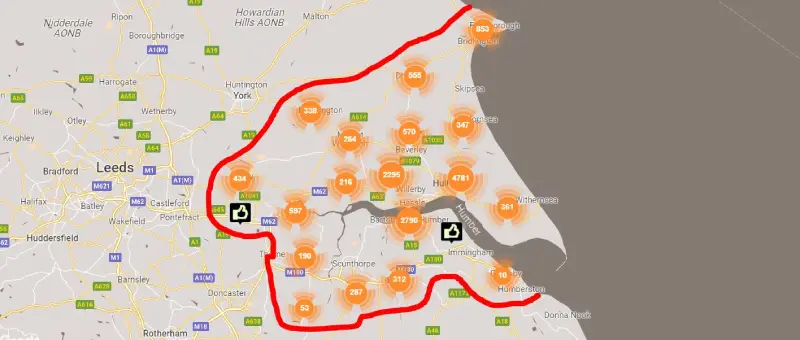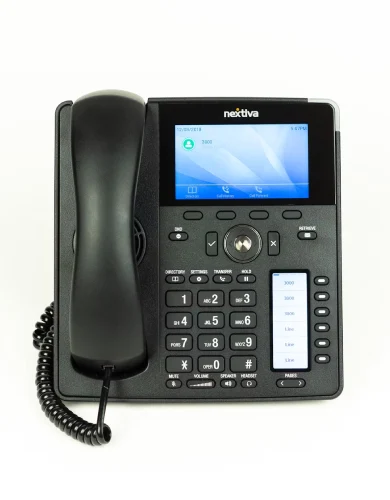Who is KCOM?
If you don’t live in Hull or haven’t traded on the London Stock Exchange in the past twenty years, you probably haven’t heard of KCOM. This broadband provider not only offers full fibre broadband to 159,000 homes in the North East but also boasts a unique history we’re eager to share with you. Let’s dive in.
Contents:
Who is KCOM?
The KCOM Group is a telecoms and IT services provider headquartered in Hull. They are best known for owning and operating the landline and fibre optic broadband network in Hull and surrounding areas.
This contrasts with the rest of the UK, where BT (British Telecom) owns and operates most of the telephony and broadband infrastructure (Virgin Media’s Cable being the notable exception!).
However, this has proven advantageous for the citizens of Hull. KCOM’s aggressive rollout of FTTP broadband throughout the city and surrounding areas made it the first city in the UK to achieve 100% full fibre coverage in 2019.
KCOM is the Universal Services Obligation provider to homes and businesses in Hull and the surrounding area
The history of KCOM
KCOM began as the “Hull Corporation” in the summer of 1902, after receiving a licence to operate the municipal telephone system in the Hull area, inaugurating their first telephone exchange in 1904.
Over the next decade, The Post Office “Telephone Department” (which eventually became BT business broadband!) based in London aggressively incorporated municipal telephone companies throughout the UK. They were eager to acquire the Hull telephony network.
However, Hull’s telephone company mounted a staunch resistance and managed to renew its licence in 1914, leaving it as the sole municipally-owned telephone corporation.
We use the term “municipality” because Hull City Council was a majority shareholder of the “Hull Corporation”, which was later renamed “Kingston Communications” (KCOM). The company continued to operate and upgrade the network over the ensuing decades, arguably more effectively than BT in the rest of the UK.
For example, KCOM’s willingness to be at the forefront of technological rollout made Hull the first city in the UK to switch from analogue to fully digital telephony as early as 1989, much earlier than the rest of the UK.
The company’s success was clear, leading Hull City Council (as the majority shareholder) to list KCOM on the London Stock Exchange in 1999. The company’s stock skyrocketed seven-fold (at the height of the dotcom bubble) within a year, temporarily placing the company in the FTSE 100 Index of the UK’s 100 largest companies.
KCOM kept leaping forward in the 2000s, introducing ADSL broadband and Digital TV. In 2007, Hull City Council sold its remaining stake in KCOM, marking the end of KCOM’s semi-public ownership and ushering in a wholly private era.
Throughout the 2010s, the now renamed “KCOM Group” upheld its pioneering reputation, delivering full fibre FTTP to all homes in Hull (again, another UK record!) and the surrounding area by 2019, giving Hull an edge over other tech areas in the UK.
Upon achieving this, the KCOM Group was acquired by the Australian Fund Macquarie Group, which delisted it from the stock exchange, transforming it into a private entity.
KCOM Services
The present-day KCOM Group offers various services for homes, businesses, and the public sector. We’ve briefly summarised them, saving you the hassle of trawling the web for answers.
KCOM Broadband Availability
As highlighted in the history section, KCOM provides business broadband availability in the city of Hull and surrounding areas. They conveniently provide their full fibre broadband services to residents within this sphere of influence.

Note that KCOM is currently in an expansion phase, extending their broadband offerings to other parts of Yorkshire and Lincolnshire, utilising BT’s infrastructure.
While KCOM is the predominant broadband provider in their region, there are other niche providers such as Giganet, Pure Broadband, and Wisper Broadband. These are available in small, localised clusters, leveraging the KCOM fibre infrastructure.
There’s also competition from mobile business broadband providers, who depend on the local 4G and 5G networks, which are outside KCOM’s control.
Importantly, KCOM exclusively offers full fibre business broadband (FTTP), having entirely phased out the older FTTC and ADSL connections in their region. Consequently, all connections reap the benefits of FTTP, including super/ultra-fast speeds, low latency, and expansive bandwidth.
KCOM Business Broadband
KCOM offers diverse solutions for small and medium businesses, landlords, enterprises and the public sector.
For small and medium businesses
Three tiers of 24-month fibre optic business broadband with unlimited data and a pay-as-you-go line rental, ensuring you only pay for the calls you make:
- Business Full Fibre 300: For small commerce w/ simple needs like PoS and guest WiFi. Cost:
- Business Full Fibre 500: For small offices with standard internet habits like videoconferencing.
- Business Full Fibre 900: For medium-sized businesses with many simultaneous users.
Please enter your postcode into our business broadband comparison tool to check the availability of these deals in your area.
For landlords
Interestingly, KCOM offers specialised packages for landlords overseeing house shares, student residences, and co-living spaces.
What sets these deals apart is the inclusion of specialised tech support and added flexibility in contract duration.
There are four landlord broadband tiers:
- Landlord 100: For smaller households.
- Landlord 300: For small to medium households with heavier internet usage.
- Landlord 500: For larger households:
- Landlord 900: The premium connection for intensive internet use.
KCOM does not publish its business broadband prices on its website.
For enterprises and public sector
The needs of larger institutions are bespoke and include complex infrastructure like mesh networks, in-house servers, high-performance routers with built-in VPN capabilities, business VoIP phone systems and leased line business broadband.
KCOM deals with these case-by-case; you can contact them directly on their website.
The future of KCOM
The recent acquisition of KCOM by a prominent international institution underscores the growing significance of telecom companies. KCOM uniquely positions itself as the infrastructure owner, operator, and service provider, allowing it to deliver an exceptionally reliable broadband service. Consider Apple’s approach, where it controls its devices’ hardware and software, arguably making it one of the most efficient providers of smartphones, computers, and tablets.
However, this monopolistic stance has resulted in limited competition from business broadband providers. This means KCOM might be less motivated to offer perks like no-contract broadband. Yet, the superior quality of their infrastructure is undeniable. Even with the growing popularity of mobile broadband, the consistent excellence of a wired connection remains unmatched.
KCOM is now setting its sights on expanding to other regions of the UK where they don’t own the infrastructure. Would you consider switching to KCOM in your locality?
KCOM FAQs
Our business broadband experts answer commonly asked questions about KCOM.
Does BT own KCOM?
No, BT and KCOM operate independently and each holds a monopoly over the landline and fibre-optic infrastructure in their respective regions.
KCOM controls the infrastructure in Hull and the surrounding area, whereas BT oversees the rest of the UK.
Both also serve as broadband providers (ISPs) within their designated territories.
For a deeper understanding, refer to our ‘History of KCOM’ section.
Is KCOM listed in the London Stock Exchange?
KCOM Group was listed on the LSE for twenty years, from 1999 to 2019. It was then delisted following its acquisition by Macquarie Group, which turned it into a private entity.
At the height of the dotcom bubble, KCOM’s stock reached a value of £15.90, which was seven times its initial listing price. For a period, it was also a part of the FTSE 100 index.
For a deeper understanding, refer to our ‘History of KCOM’ section.
Is KCOM the only broadband provider available in Hull?
No, while KCOM is the most widely available broadband provider, and many homes and businesses in Hull and the surrounding area have contracts, they aren’t the sole option.
There are smaller, niche broadband providers in specific local areas that utilise KCOM’s infrastructure to offer their broadband packages.
For more details, refer to our ‘KCOM Availability’ section.
Does KCOM offer mobile broadband?
No, KCOM currently does not provide mobile broadband services or possesses no cellular network infrastructure.
How can I switch to KCOM?
You can easily switch business broadband providers to KCOM by using our simple broadband comparison service. Simply enter your postcode to see all the providers available in your area, including KCOM.
Do KCOM own Hull City Football Club?
No, this is a common misconception. The confusion likely stems from the fact that Hull City A.F.C.’s stadium was named the “KC Stadium” in 2003 after “Kingston Communication” (now KCOM Group) became one of their sponsors.
In 2016, in line with the company’s rebranding, the stadium’s name was updated to the “KCOM Stadium”. However, in 2021, it was renamed the “MKM Stadium” following a change in sponsorship.
It’s essential to clarify that these name changes were solely related to sponsorship and had no bearing on the actual ownership of the club!

